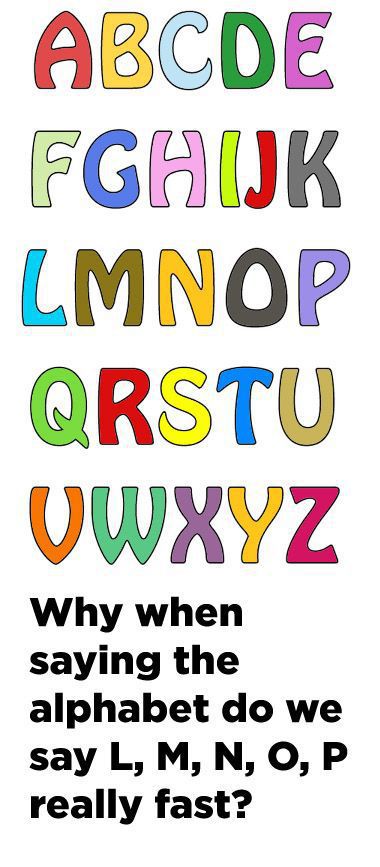1.

Fenrisulven 13 year s ago
Too much stuff that only relates to Americans in this post.
Anyway, you forgot: why does people hit the computer screen and not the computer when it's slow? (not related to laptops etc)
Anyway, you forgot: why does people hit the computer screen and not the computer when it's slow? (not related to laptops etc)
3.

j b 13 year s ago
#16 stupid languages like English? :-)
In the old days, "w" was a vowel. Like the Walisian harp called "crwt" - pronounced as if written "crooth". Or listen to the sound of "uuoman", "couu" or "vouuel" ...sorry, "woman", "cow" and "vowel".
Even other letter pairs are unclear about vowel/consonant. "i" and "j" were earlier the same letter. In some languages and words/names, the sound was more consonant-like, so the "j" spelling was adopted, while languages with a more vowel-like pronounciation chose the "i" spelling. A couple examples: The Norwegian queen is named "Sonja" in Norwegian; the English form of the same name is "Sonia". The Swedish children's book/movie heroine "Ronia, the robber's daughter" is named "Ronja" in the original text. And, the Norwegian/Swedish pronounciation of these names IS slightly different from the English; you CAN hear the consonant.
In the old days, "w" was a vowel. Like the Walisian harp called "crwt" - pronounced as if written "crooth". Or listen to the sound of "uuoman", "couu" or "vouuel" ...sorry, "woman", "cow" and "vowel".
Even other letter pairs are unclear about vowel/consonant. "i" and "j" were earlier the same letter. In some languages and words/names, the sound was more consonant-like, so the "j" spelling was adopted, while languages with a more vowel-like pronounciation chose the "i" spelling. A couple examples: The Norwegian queen is named "Sonja" in Norwegian; the English form of the same name is "Sonia". The Swedish children's book/movie heroine "Ronia, the robber's daughter" is named "Ronja" in the original text. And, the Norwegian/Swedish pronounciation of these names IS slightly different from the English; you CAN hear the consonant.
7.
Terje 13 year s ago
is that so? :) I live in Norway, where we have the E grade. And sure enough, there was this guy last summer who got sentenced to jail for forging a F into an E...
8.

j b 13 year s ago
#13: When I first asked about this, I was explained that it was to avoid discussions. D is the lowest passing grade, so if you are TWO below that, then there is no doubt. Maybe the F could be raised to E, but it still would be a fail, so an appeal is probably useless.
When I was teaching (and evaluating test), I followed the same principle: When adding score points (which frequently requires non-exact judgements), whenever a candidate would ALMOST pass, I would review my point assignments to pull him above the line. That happened quite often, and the effect was to create a "hole" in the points earned (for the class as a whole): The score for those failing was significantly below the passing limit. A few times, there were students trying to appeal a just-passing grade, and when I explained the scoring to them before they filed a formal appeal (that was a mandatory part of the procedure), every one of them accepted the orignial grading.
When I was teaching (and evaluating test), I followed the same principle: When adding score points (which frequently requires non-exact judgements), whenever a candidate would ALMOST pass, I would review my point assignments to pull him above the line. That happened quite often, and the effect was to create a "hole" in the points earned (for the class as a whole): The score for those failing was significantly below the passing limit. A few times, there were students trying to appeal a just-passing grade, and when I explained the scoring to them before they filed a formal appeal (that was a mandatory part of the procedure), every one of them accepted the orignial grading.
9.
AnnaMolly 13 year s ago
#16 (j b = TL;DR) the letter U was written like V in Latin. I don't know if it is THE answer but that's one answer anyway.
11.
DarkWolf 13 year s ago
#10 Because you should be looking and paying attention. Not staring at the ground.
#12 To check for barf drool
#13 There used to be an E years ago. But then they wanted to make sure you knew how bad you Failed.
#15 It's a more eliquent form of writing. Sadly, one which will be totally lost soon enough.
#16 What AnnaMolly said.
#18 Agree.
#21 Because you suck at drawing.
#22 Size. The dual springs under it as well as the larger size makes it sound deeper.
#23 Because it is. She has a mild mannered secret identity.
#24 And this surprises you... why?
#12 To check for barf drool
#13 There used to be an E years ago. But then they wanted to make sure you knew how bad you Failed.
#15 It's a more eliquent form of writing. Sadly, one which will be totally lost soon enough.
#16 What AnnaMolly said.
#18 Agree.
#21 Because you suck at drawing.
#22 Size. The dual springs under it as well as the larger size makes it sound deeper.
#23 Because it is. She has a mild mannered secret identity.
#24 And this surprises you... why?
12.
Cancamuso 13 year s ago
Cursive is used to write foreign language words. For example "We are going to it [c]burritos[/c].
At least that's the rule in Spanish when we must write something in English without the translation.
At least that's the rule in Spanish when we must write something in English without the translation.









Anyway, you forgot: why does people hit the computer screen and not the computer when it's slow? (not related to laptops etc)
In the old days, "w" was a vowel. Like the Walisian harp called "crwt" - pronounced as if written "crooth". Or listen to the sound of "uuoman", "couu" or "vouuel" ...sorry, "woman", "cow" and "vowel".
Even other letter pairs are unclear about vowel/consonant. "i" and "j" were earlier the same letter. In some languages and words/names, the sound was more consonant-like, so the "j" spelling was adopted, while languages with a more vowel-like pronounciation chose the "i" spelling. A couple examples: The Norwegian queen is named "Sonja" in Norwegian; the English form of the same name is "Sonia". The Swedish children's book/movie heroine "Ronia, the robber's daughter" is named "Ronja" in the original text. And, the Norwegian/Swedish pronounciation of these names IS slightly different from the English; you CAN hear the consonant.
When I was teaching (and evaluating test), I followed the same principle: When adding score points (which frequently requires non-exact judgements), whenever a candidate would ALMOST pass, I would review my point assignments to pull him above the line. That happened quite often, and the effect was to create a "hole" in the points earned (for the class as a whole): The score for those failing was significantly below the passing limit. A few times, there were students trying to appeal a just-passing grade, and when I explained the scoring to them before they filed a formal appeal (that was a mandatory part of the procedure), every one of them accepted the orignial grading.
#12 To check for barf drool
#13 There used to be an E years ago. But then they wanted to make sure you knew how bad you Failed.
#15 It's a more eliquent form of writing. Sadly, one which will be totally lost soon enough.
#16 What AnnaMolly said.
#18 Agree.
#21 Because you suck at drawing.
#22 Size. The dual springs under it as well as the larger size makes it sound deeper.
#23 Because it is. She has a mild mannered secret identity.
#24 And this surprises you... why?
At least that's the rule in Spanish when we must write something in English without the translation.
its the alphabet song idiots, it is made so kids can learn the alphabet... it's catchy
#1 because most people learn the alphabet from the alphabet song which is also twinkle twinkle little star